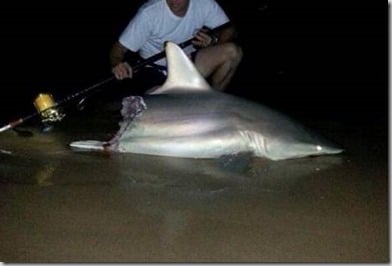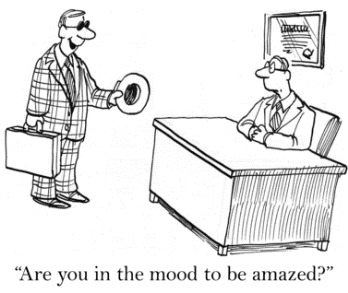Originally posted on January 1, 2014 @ 12:00 PM
My Story is Better than Yours
 Guest Post by Rob Sams from Dolphin Safety Systems. Improving safety really is as simple and as cheap as doing more listening and conversing rather than telling………..
Guest Post by Rob Sams from Dolphin Safety Systems. Improving safety really is as simple and as cheap as doing more listening and conversing rather than telling………..
In my last piece (Safety Professionals – Piggy in the Middle) I wrote about the role of the modern day safety professional and how at times we can feel like we are stuck in the middle. It’s a tough gig being in health and safety in today’s environment. If we follow the path of traditional safety, which can easily focus on telling rather than having effective dialogue and listening, I do wonder whether we will ever see a real change in health and safety in Australia.
So what do I mean that we focus on ‘telling’? Think about a typical ‘day in the life’ of a safety professional. It’s audits, risk assessments, training, toolbox talks, inspections and the list goes on. All ‘telling’ right?
We ‘tell’ people what’s wrong via audits, ‘tell’ people what may hurt them through ‘doing’ risk assessments, ‘tell’ people what procedures to follow when we train and do toolbox talks, and then do inspections to find, and ultimately tell, all about faults. Tell, tell and more telling. Is it any wonder that at times when we walk into a room, a workshop or a site, that people turn off?
 Have you ever been in that situation where you’ve just delivered a training session on the latest procedure you’ve written, then thought, “that was great, I told them exactly what they needed to know. I used real examples, my training was interactive, I did some small group sessions and they did a short fun quiz at the end”. Maybe you thought, that was contemporary training right? Only to have a feeling of frustration two weeks later when doing an incident investigation and you find that one of those employees who “passed the test” didn’t follow the procedure. What were they thinking? They knew what to do. You told them very clearly, they said they understood. What went wrong???
Have you ever been in that situation where you’ve just delivered a training session on the latest procedure you’ve written, then thought, “that was great, I told them exactly what they needed to know. I used real examples, my training was interactive, I did some small group sessions and they did a short fun quiz at the end”. Maybe you thought, that was contemporary training right? Only to have a feeling of frustration two weeks later when doing an incident investigation and you find that one of those employees who “passed the test” didn’t follow the procedure. What were they thinking? They knew what to do. You told them very clearly, they said they understood. What went wrong???
If we focus all of our attention on ‘telling’ people “what they need to know”, I wonder how we will ever get others to own health and safety.
It reminds me of a story last week when I was driving with my daughter and her young cousins. She is ten and her cousins are around the same age. They were telling their stories – what happened during the week, what games did they play during their lunch break, what they did on sports day, and there was something about One Direction, Justin Bieber. The list goes on….
I listened with interest. I learnt a lot. Problem was… I found it hard work to listen. Why? Because they were all talking at once! Each story of “I did this……” was met with a “Yep, I did that…..” followed by “Yeah, I did this and that….” You probably know the situation, kids talking over each other, telling their ‘war stories’, with the main goal of being able to say…. “My story is better than yours……”
We all relate to this with kids, it’s quite innocent at that age, full of enthusiasm and passion, right? Funny that I’ve also heard the same thing said about a lot of safety professionals. In fact I’ve heard that said about me! “You’re so passionate about safety Rob, you really feel it, you tell such good stories and get our attention.” It was quite a boost to my ego hearing this.“
But! It has it’s down side too…..
The most inspirational boss I ever had gave me the most significant piece of advice that sticks with me to this day. It goes something like this…. “Rob, your presentations are great, you have presence, passion and people really listen to you. The way you tell a story really gets people thinking.”
Great feedback, it felt good. Then came the BUT….. “But, my question to you he said…. “What legacy do you leave people when you go? When you are not here, when you are not delivering your passionate story, what happens then? Why is safety all about you, and what impact does that have when you’re not there?”
What a question I thought. So you are saying I’m good, I’m passionate, people listen to what I say. That’s good right? This makes me think of my daughter and her cousins. I wonder whether people were really listening to me, I wonder whether I really had an impact on people? I wonder whether it really made a difference, all this talking and telling. Was I just telling my story and trumping them because they didn’t have a better story, and did this mean they weren’t really listening? Or maybe I was just entertaining them and what I was saying or ‘telling’, didn’t really have an impact at all. Maybe what I was really saying was “My story is better than yours….?”
With my daughters discussion with her cousins, she didn’t know, probably didn’t even really mind, if they weren’t listening. I wonder whether I was the same? Did I really think about whether people were listening, whether they really understood what I was saying, whether they would do anything different? Or, was I was more concerned about the response from the audience. Did they like it, did they find it interesting, even entertaining? Did they think I was a good bloke sharing a story, you know, ‘passionate’. If they liked what I was saying, that meant that they were serious about safety right?
I’ve learnt through my career, and by listening to my daughter and her cousins. It does not matter whether people think my stories are interesting, passionate or entertaining, what really matters is were people engaged and did they translate the story into their own behavior. What I wonder now is, can this really be done at all by ‘telling’, no matter how well and how entertaining the story is?
Is it our job as a safety professional to tell people “my story is better than yours”, Is it about “wow, what a story”? Or, is it about asking people questions and engaging in effective dialogue so that they own their own safety? Is our job really about moving people from unconscious thinking, sometimes referred to as autopilot, to conscious thinking? People don’t need, in fact generally don’t appreciate, being ‘told’ what’s dangerous or not. They need to realize it for themselves for them to truly ‘own’ it. How can we expect someone to own something if they don’t discover it themselves, and how can people discover things themselves if all we do is tell, tell, tell?
The only way that people can discover things for themselves is by us asking questions, creating dialogue having effective conversations. That is, to do more ‘asking’ than ‘telling’, to resist from instructing and telling war stories, and instead make humble enquiries. This is the fundamental challenge we have in our profession, to move away from a position where we are expected to have all the answers to a situation, and as a result ‘own’ safety, to where we feel ok to be the facilitator, rather than the ‘teller’.
I wonder how we ever think we will drive safety ownership if we are the ones doing all the thinking and talking? I also wonder whether we need to spend more time having conversations and consider the impact that conversations can have on health and safety performance?
Maybe we have to challenge ourselves to ask more and not tell. Effective conversations can, and do, make a difference. They help bring safety, and a lot of other things for that matter, from our unconscious to the conscious mind. This is what leads to people ‘owning’ their own health and safety. People don’t do unsafe things because they are stupid, they do it because they are running on autopilot, or distracted, or rushing. All of those things happen because of what is happening in our sub-conscious. Through effective dialogue, we can stop for a moment and move out of autopilot, stop the distraction or slow down and not rush. All of these are things that can prevent an incident from occurring, and they don’t require expensive processes or engineering solutions. They require effective dialogue.
Perhaps we shouldn’t worry so much about who’s story is better, just as long as we are engaging in effective dialogue which brings our unconscious thinking into the conscious?



Do you have any thoughts? Please share them below